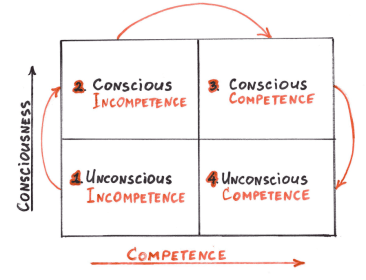"The capacity to learn is a gift; The ability to learn is a skill; The willingness to learn is a choice."
Curated from: harmoniousresolutions.com
Ideas, facts & insights covering these topics:
8 ideas
·2.45K reads
8
Explore the World's Best Ideas
Join today and uncover 100+ curated journeys from 50+ topics. Unlock access to our mobile app with extensive features.
“The capacity to learn is a gift; The ability to learn is a skill; The willingness to learn is a choice.”
BRAIN HERBERT
151
516 reads
The Learning Model
The “conscious competence” learning model is a way to learn new skills in the future, having 4 stages:
- Unconscious Incompetence
- Conscious Incompetence
- Conscious Competence
- Unconscious Competence
131
437 reads
Unconscious Incompetence
Stage One of this learning model is Unconscious Incompetence, where you are clueless and overwhelmed and don't know why.
In this stage: You don't know what you don't know.
102
328 reads
Conscious Incompetence
Start to diagnose and find what the problem is. Once you know and acknowledge the problem, you also know the skill you need to master to be able to handle the problem.
You are at Stage Two: Conscious Incompetence. In this stage, you know what you don't know.
105
256 reads
Conscious Competence
In Stage Three: Conscious Competence, you are aware of the problem and start to design and implement a strategy to tackle it.
You are determined, willing to learn, and overcome any challenges to master the skill(s). This is when you know what you know.
104
262 reads
Unconscious Competence
Stage Four: Unconscious Competence, is when you are skillfully, naturally, and easily able to handle the problem, without any mental effort. The skill that you have learned are now imbibed in you. In this stage, you don't know what you know.
This Learning Model can be used to break old habits and acquire new skills if implemented with focus and awareness.
106
247 reads
After you skillfully say "No" about 50 times to 30 different people, you become a master of saying 'No'. It comes without mental effort on your part and it happens fast, naturally, easily, and graciously. You arrive at stage # 4, Unconscious Competence! (You don't know what you know). What a great place to be in!
73
197 reads
IDEAS CURATED BY
Jason Z.'s ideas are part of this journey:
Learn more about personaldevelopment with this collection
How to manage workplace stress
How to prioritize and make better decisions
How to learn anything fast
Related collections
Similar ideas
6 ideas
The Five Stages of Learning and How to Apply Them to Any Skill
betterhumans.pub
3 ideas
Read & Learn
20x Faster
without
deepstash
with
deepstash
with
deepstash
Personalized microlearning
—
100+ Learning Journeys
—
Access to 200,000+ ideas
—
Access to the mobile app
—
Unlimited idea saving
—
—
Unlimited history
—
—
Unlimited listening to ideas
—
—
Downloading & offline access
—
—
Supercharge your mind with one idea per day
Enter your email and spend 1 minute every day to learn something new.
I agree to receive email updates


